Kateryna Stepanenko, Riley Bailey, Grace Mappes, Angela Howard, George Barros, and Frederick W. Kagan
Click here to see ISW’s interactive map of the Russian invasion of Ukraine. This map is updated daily alongside the static maps present in this report.
Click here to access ISW’s archive of interactive time-lapse maps of the Russian invasion of Ukraine. These maps complement the static control-of-terrain maps that ISW produces daily by showing a dynamic frontline. ISW will update this time-lapse map archive monthly.
The Kremlin accused Ukraine of conducting a border incursion in Bryansk Oblast, Russia on March 2 — a claim that Ukrainian officials denied. Bryansk Oblast Governor Alexander Bogomaz claimed that “several dozen” Ukrainian saboteurs conducted an armed incursion into the villages of Lyubenchane and Sushany on the international border.[1] The Russian Federal Security Service (FSB) doubled down on Bogomaz’s accusation and claimed that the Russian National Guard (Rosgvardia) conducted an operation to “eliminate” Ukrainian saboteurs who reportedly killed one individual and took up to six individuals hostage.[2] Russian milbloggers and news aggregators offered differing information about the number of casualties and hostages, including claims that Ukrainian saboteurs fired on a school bus.[3] Russian President Vladimir Putin then responded unusually quickly to these claims, alleging that “neo-Nazis and their owners” carried out a “terrorist attack” against Bryansk Oblast.[4] Putin did not directly name Ukraine as the perpetrator of the attack in his televised statement, prompting Russian state media to later clarify that Putin meant ”Ukrainian neo-Nazis.”[5] Putin also claimed that Russia will "crush” neo-Nazis that have consistently aimed to deprive Russia of its history, killed the daughter of Russian nationalist ideolog Alexander Dugin, and ”killed people in Donbas.”[6]
Ukrainian officials denied the Kremlin’s accusations of Ukraine’s involvement in Bryansk Oblast and claimed that Russian officials might be facing problems with increasing partisan activity in Russia. Ukrainian Presidential Adviser Mykhailo Podolyak stated that Russian accusations are a deliberate “provocation” aimed at scaring the Russian people into believing that Russia needs to continue to fight in Ukraine.[7] Representative of the Ukrainian Main Military Intelligence Directorate (GUR) Andriy Yusov stated that the incident in Bryansk Oblast is “part of transformative processes in Russia” and pointed to inter-ethnic, inter-religious, and socio-economic conflicts among Russian citizens in Russia.[8] Yusov also noted that the March 2 public statements of the Russian Volunteer Corps’, which claimed responsibility for the incursion, further show that “Russia is beginning to wake up against Putin’s bloody dictatorship.”[9] Yusov likely referred to two videos uploaded by Russian Volunteer Corps fighters claiming that they crossed the international border into Bryansk Oblast to “liberate” fellow Russian citizens from Putin’s dictatorship without harming Russian civilians.[10] The Russian Volunteer Corps claims to be an all-Russian, Ukraine-based armed formation operating under the Ukrainian Armed Forces; however, it is unclear if the group is affiliated with the Ukrainian military. The head of Dutch open-source investigative group Bellingcat's far-right monitoring project reported that the leader of the Russian Volunteer Corps, Denis Kapustin, is a notable far-right extremist figure.[11] Social media users geolocated one of the two videos showing two servicemen with the Russian Volunteer Corps flag to Sushany.[12] ISW cannot independently verify Russian, Ukrainian, or Russian Volunteer Corps’ claims at this time, and the two videos each showing two men in uniform holding a flag remains the only concrete evidence available that anything happened.
The Bryansk incident generated speculation by Russian officials and ultranationalist groups about the Kremlin’s response to the situation. Kremlin Spokesperson Dmitry Peskov refused to comment on questions regarding any change of the “special military operation” status to “war” because of the incident.[13] Wagner Group financier Yevgeny Prigozhin sarcastically observed that Russia had been allowing Ukraine to violate its “red lines” and used the opportunity to promote Wagner mercenaries.[14] Russian officials such as Crimean occupation head Sergey Aksyonov and Chechen leader Ramzan Kadyrov along with milbloggers called on the Kremlin to expand security measures and conduct retaliatory operations.[15] Kadyrov, for example, called on the Kremlin to target civilians to punish the perpetrators of this incident - effectively calling for Russia to conduct war crimes. Kremlin-affiliated milbloggers and former proxy officials also called on the Kremlin to designate the Ukrainian Armed Forces, the Russian Volunteer Corps, and Ukrainian armed organizations as terrorist organizations and compared the incident to the Beslan school siege in North Ossetia in 2004.[16] A Kremlin-affiliated milblogger claimed that the Russian Volunteer Corps was responsible for the murder of Daria Dugina and other terrorist activity in Russia.[17] Russian milbloggers also called on the Kremlin to use this incident to form a Supreme High Command to undertake all political, military, and economic decisions to ensure that Russia wins the war.[18] Other milbloggers also linked the incident to recent Putin statements that the FSB needs to strengthen border protection and advocated for more resources for border units.[19] Some milbloggers called on Russia to form assassination squads to kill Ukrainian officials and form exclusion zones at the border.[20] These responses indicate that the ultranationalist community is largely dissatisfied with numerous aspects of the Kremlin’s inability to fully commit to its own false rhetoric that Russia is fighting an “existential war” in Ukraine. The Kremlin does not have the capacity to satisfy all of these ultranationalists’ demands and may seize this opportunity to introduce additional security provisions in Russia that would benefit Putin without committing Russia to a higher risk or domestic unrest — such as declaring war.
German Chancellor Olaf Scholz stated on March 2 that Germany is negotiating with allies about providing security guarantees to Ukraine but provided no further details on these proposed guarantees.[21] Scholz emphasized that the pact would only work if Ukraine prevailed in the war. Scholz mentioned the security guarantees while criticizing China for failing to condemn the Russian invasion of Ukraine and calling on Chinese authorities to pressure Russia into withdrawing Russian forces from Ukraine. Scholz’s statements are consistent with reports of a proposed Ukraine-NATO defense pact that would provide enough arms to Ukraine to force Russia to the negotiation table, but would not offer Article V protection or obligate NATO states to deploy forces to Ukraine. ISW has recently assessed that such an agreement appears to reflect a desire to pressure Ukraine to accept a negotiated settlement on unfavorable terms, especially as Russian President Vladimir Putin is currently unlikely to compromise on his maximalist goals of demilitarization and de facto regime change in Ukraine.[22]
US Secretary of State Antony Blinken briefly spoke with Russian Foreign Minister Sergei Lavrov at the G20 summit in New Delhi, India on March 2 about Russia’s suspension of the New Strategic Offensive Arms Reduction Treaty (New START).[23] Blinken stated that he urged Lavrov to reverse Russia’s February 28 suspension of Russian cooperation with New START, which imposes verifiable limits on the number of Russian and US intercontinental-range nuclear weapons. Blinken expressed US readiness to collaborate with Russia on strategic nuclear arms control regardless of the status of the war in Ukraine or the US-Russia relationship.[24] Blinken separately called on Russia to stop its war in Ukraine and come to the negotiating table and to release detained American Paul Whelan.[25] Russian officials are highly unlikely to pursue meaningful discussions to restore New START, however. The Kremlin very probably is weaponizing fears of nuclear escalation and the suspension of New START in hopes of deterring Western support for Ukraine and slowing down pledged Western military aid transfers. The Kremlin remains extremely unlikely to use nuclear weapons but routinely makes low-credibility threats of nuclear escalation in an effort to intimidate the West and appeal to its ultranationalist base, as ISW has previously reported.[26]
Russian authorities appear to be concerned over a growing loss of leverage in Serbia, which Russia has worked to integrate into the Russian sphere of influence for many years. Russian Ministry of Foreign Affairs (MFA) Spokesperson Maria Zakharova stated on March 2 that reports of Serbian authorities secretly transferring multiple-launch rocket systems (MLRS) ammunition to Ukraine are a matter of “deepest concern.”[27] Russian state-affiliated news aggregator Mash claimed on February 27 that Serbian defense company Krusik supplied over 3,500 Grad MLRS rockets to Ukraine but claimed that it is not clear that Krusik knew that Ukraine was the final buyer of the rockets.[28] Wagner Group financier Yevgeny Prigozhin responded to Serbian President Alexander Vucic’s prior complaint that Wagner Group is recruiting in Serbia, claiming that no Serbian personnel have served in Wagner Group in 2023 and characterizing Vucic as having “thrown a tantrum in vain.”[29] Vucic’s complaints about Wagner Group recruitment efforts in Serbia are one factor in Vucic’s possible reconsideration of Serbia’s close ties with Russia, as ISW has recently reported.[30]
Wagner Group financier Yevgeny Prigozhin and several Russian milbloggers continue to debate the appropriateness of criticism of Russian war efforts as they react to a proposed amendment to Russia’s Criminal Code which would increase punishments for “discrediting” the war in Ukraine. Prigozhin on March 1 defended his statements made earlier that day defending criticism of the war effort. Prigozhin claimed that Russians should have the right to criticize Russian commanders and strategists, including himself, but not to criticize or “discredit” ordinary soldiers.[31] Russian milblogger Yuri Kotyenok defended restrictions on “discreditation attempts,” arguing that criticism of Russian soldiers of all levels — from soldier to supreme commander — is like shooting them in the back. Kotyenok conceded that some criticism is necessary but said that it must be made carefully and in a limited way. Kotyenok added that Wagner Group representatives have earned the right to their “special opinion” due to their efficient fighting near Bakhmut.[32] Former Russian officer (and avid critic of Russian President Vladimir Putin) Igor Girkin feigned repentance on March 2 and mockingly instructed his users “not” to make statements calling Russian leadership “illiterate, irresponsible mediocrities” and telling them to refer to major failures as victories, offering as an example the “alternative successes” in Vuhledar.[33]
Key TakeawaysThe Kremlin accused Ukraine of conducting a border incursion in Bryansk Oblast, Russia, on March 2 — a claim that Ukrainian officials denied.
The alleged Bryansk incident generated speculations from Russian officials and ultranationalist groups about the Kremlin's response to the situation.
German Chancellor Olaf Scholz stated on March 2 that Germany is negotiating with allies about providing security guarantees to Ukraine but provided no further details on these proposed guarantees.
US Secretary of State Antony Blinken briefly spoke with Russian Foreign Minister Sergei Lavrov at the G20 summit in New Delhi, India on March 2 about Russia’s suspension of the New Strategic Offensive Arms Reduction Treaty (New START). The Kremlin very probably is weaponizing New START and fears of nuclear escalation in hopes of deterring Western support for Ukraine.
Russian authorities appear to be concerned over a growing loss of leverage in Serbia, which Russia has worked to integrate into the Russian sphere of influence for many years.
Russian ultranationalists continue to debate the appropriateness of criticism of Russian war efforts and to react to proposed increased punishments for “discrediting” the war in Ukraine.
Russian forces continued limited ground attacks northeast of Kupyansk and offensive operations around Kreminna.
Russian forces continued offensive operations around Bakhmut, along the western outskirts of Donetsk City, and in western Donetsk Oblast.
Russian forces appear to have temporarily scaled back efforts to encircle Bakhmut from the southwest as well as from the northeast and may instead be focusing on pressuring Ukrainian forces to withdraw from the city by concentrating on the northeastern offensive.
Russian sources claimed that Russian forces downed two Ukrainian UAVs in Crimea.
Wagner Group financier Yevgeny Prigozhin announced that the Wagner Group has launched recruiting efforts through Russian sports clubs.
Russian occupation officials denied reports of the deportation of Ukrainian children to Russian territories.
We do not report in detail on Russian war crimes because those activities are well-covered in Western media and do not directly affect the military operations we are assessing and forecasting. We will continue to evaluate and report on the effects of these criminal activities on the Ukrainian military and population and specifically on combat in Ukrainian urban areas. We utterly condemn these Russian violations of the laws of armed conflict, Geneva Conventions, and humanity even though we do not describe them in these reports.Russian Main Effort—Eastern Ukraine (comprised of two subordinate main efforts)
Russian Subordinate Main Effort #1—Capture the remainder of Luhansk Oblast and push westward into eastern Kharkiv Oblast and encircle northern Donetsk Oblast
Russian Subordinate Main Effort #2—Capture the entirety of Donetsk Oblast
Russian Supporting Effort—Southern Axis
Russian Mobilization and Force Generation Efforts
Activities in Russian-occupied Areas
Russian Main Effort—Eastern Ukraine
Russian Subordinate Main Effort #1— Luhansk Oblast (Russian objective: Capture the remainder of Luhansk Oblast and continue offensive operations into eastern Kharkiv Oblast and northern Donetsk Oblast)
Russian forces continued limited attacks northeast of Kupyansk and are fortifying border positions in Belgorod Oblast. A Kremlin-affiliated milblogger claimed on March 1 that Russian forces repelled a Ukrainian attempt to regain positions in Hryanykivka (about 16km northeast of Kupyansk).[34] The Ukrainian General Staff reported on March 2 that Russian forces are continuing to fortify positions in border areas of Belgorod Oblast and are establishing anti-tank barriers.[35]
Russian forces continued offensive operations around Kreminna on March 2. The Ukrainian General Staff reported that Ukrainian forces repelled Russian assaults near Kreminna, Bilohorivka (about 13km south of Kreminna), and Spirne (about 32km south of Kreminna).[36] Russian war correspondents claimed that elements likely of the Russian 98th Guards Airborne Division from Ivanovo Oblast are attempting to advance through a densely defended frontline in the Kreminna direction.[37] Russian milbloggers also indicated that elements of the 3rd Guards SPETSNAZ Brigade and reconnaissance groups of the 144th Guards Motor Rifle Division of the 20th Guards Combined Arms Army of the Western Military District are continuing to operate on the Svatove-Kreminna line.[38] A Kremlin-affiliated milblogger claimed that Russian artillery fire stopped a Ukrainian five-hour-long counteroffensive operation near Kreminna and that Russian airborne elements seized unspecified Ukrainian fortifications in the area on March 1.[39] Another Kremlin-affiliated milblogger claimed that Russian forces seized unspecified heights in the area of the Balka Zhuravka gully northwest of Kreminna.[40]
Luhansk Oblast Administration Head Serhiy Haidai reported that Russian forces have concentrated a significant portion of their heavy military equipment in Luhansk Oblast but have been unable to use most of it due to unfavorable weather conditions on the frontlines.[41] Haidai added that Russians are using Terminator armored fighting vehicles and T-90M tanks in the Kreminna direction, which indicates that Russian forces are continuing to prioritize this direction for an advance.[42] Haidai also stated that Russian efforts to attack in small groups on the Luhansk Oblast frontline are not successful, resulting in losses among personnel and military equipment.[43]
Russian Subordinate Main Effort #2—Donetsk Oblast (Russian objective: Capture the entirety of Donetsk Oblast, the claimed territory of Russia’s proxies in Donbas)
Russian forces continued offensive operations around Bakhmut on March 2. The Ukrainian General Staff reported that Ukrainian forces repelled Russian assaults near Bakhmut, Orikhovo-Vasylivka (11km northwest of Bakhmut), Dubovo-Vasylivka (7km northwest of Bakhmut), Khromove (3km west of Bakhmut), and Ivanivske (6km west of Bakhmut).[44] The repelled Russian assault near Khromove suggests that Russian forces have likely advanced northwest of Bakhmut. Geolocated footage published on March 2 indicates that Russian forces likely secured gains south of Dubovo-Vasylivka.[45] A Russian milblogger claimed that Wagner Group fighters advanced in the direction of Hryhorivka (10km northwest of Bakhmut) and Bohdanivka (6km west of Bakhmut) and conducted offensive operations near Fedorivka (17km north of Bakhmut), Rozdolivka (17km north of Bakhmut) and Vesele (18km northeast of Bakhmut).[46] Geolocated footage published on March 2 indicates that Russian forces have likely advanced in eastern Bakhmut.[47] Russian milbloggers claimed that Russian forces continued offensive operations in southern Bakhmut moving north from Opytne (4km south of Bakhmut), in the eastern part of the city, and in northern Bakhmut moving south from Yahidne (2km north of Bakhmut).[48] Geolocated footage published on March 2 indicates that Russian forces likely advanced near Bila Hora (13km southwest of Bakhmut).[49] Russian milbloggers claimed that Wagner fighters conducted attacks in the direction of Bila Hora and Chasiv Yar (12km west of Bakhmut) and are attempting to cut off a section of the T0504 highway.[50] The Donetsk People’s Republic (DNR) People’s Militia claimed that the DNR 132nd Brigade of the 1st Army Corps (formerly the DNR People’s Militia 3rd Brigade) advanced in the direction of Toretsk (22km southwest of Bakhmut).[51]
Russian forces appear to have temporarily scaled back efforts to encircle Bakhmut from the southwest as well as from the northeast and may instead be focusing on pressuring Ukrainian forces to withdraw from the city by concentrating on the northeastern offensive. Russian forces have intensified offensive operations in the northern outskirts and suburbs of Bakhmut in recent weeks and have secured gains in these areas.[52] Russian forces have not advanced closer to the T0504 highway between Bakhmut and Chasiv Yar in this time following a period of intensified operations southwest of Bakhmut in late January and early February of 2023.[53] Russian milbloggers have similarly shifted their attention from Russian operations to capture Ivanivske and positions along the T0504 highway to Russian operations in northern Bakhmut, particularly those focused on capturing Khromove.[54] Russian forces would likely need to capture both Ivanivske and Khromove to cut off Ukrainian ground lines of communication (GLOCs) into Bakhmut and completely encircle the Ukrainian grouping in the city. Russian forces may be attempting to pressure Ukrainian forces in Bakhmut to conduct a tactical retreat through the T0504 highway and therefore have reduced their efforts to encircle the settlement by capturing Ivanivske as well. The double envelopment of Bakhmut would likely require further manpower and equipment commitments and Russian forces may intend to avoid the further costs of a potential encirclement. Russian forces continue to attack along the T0504 line, however, and may resume more concerted efforts in this direction. Russian forces conducted a similar operational shift in their offensive to capture Severodonetsk and Lysychansk in Luhansk Oblast in June and July of 2022. Ukrainian forces in Severodonetsk and Lysychansk conducted controlled tactical retreats after sustaining increased pressure from Russian forces that initially intended to completely encircle Ukrainian forces in the settlements.[55]
Ukrainian officials are setting informational conditions for a potential withdrawal from Bakhmut but have not indicated that Ukrainian forces intend to leave the city. Ukrainian Eastern Grouping of Forces Spokesperson Colonel Serhiy Cherevaty stated on March 2 that Ukrainian forces will conduct a tactical retreat from Bakhmut if there is a need to do so.[56] Cherevaty stated that Ukrainian forces’ main focus is to achieve strategic results and recalled that Ukrainian forces liberated large amounts of territory in Kharkiv Oblast and around Lyman, Donetsk Oblast following Russia’s costly offensive to capture Severodonetsk and Lysychansk in Luhansk Oblast.[57] ISW has previously assessed that the Ukrainian defense of Bakhmut is a strategically sound operation to force Russian forces to extend manpower and equipment on costly assaults to capture a city of limited operational importance.[58] Ukrainian forces have already achieved this strategic aim, and the continued Ukrainian defense of the city will remain strategically sound as long as the costs of holding the city do not outweigh the continued impacts on Russian manpower and equipment. Ukrainian officials continue to emphasize that Ukrainian forces have the option to conduct a controlled withdrawal from Bakhmut if they see fit.[59]
Russian forces continued offensive operations along the western outskirts of Donetsk City on March 2. The Ukrainian General Staff reported that Russian forces conducted unsuccessful offensive operations near Avdiivka, within 7km northeast of Avdiivka near Kamianka and Vesele, and within 27km southwest of Avdiivka near Sieverne, Vodyane, Nevelske, and Marinka.[60] Geolocated footage published on March 2 indicates that Russian forces likely secured marginal gains northeast of Vodyane (8km southwest of Avdiivka).[61] A Russian milblogger claimed that elements of the 150th Motorized Rifle Division of the 8th Combined Arms Army of the Southern Military District are continuing to storm Ukrainian positions in Marinka and that elements of the 20th Motorized Rifle Division of the 8th Combined Arms Army are attempting to advance south of the city.[62] A Russian milblogger claimed that Russian forces also conducted an assault on Pervomaiske (12km southwest of Avdiivka) from Pisky (9km southwest of Avdiivka).[63]
Russian forces continued offensive operations in western Donetsk Oblast on March 2. Geolocated footage published on March 1 indicates that Russian forces likely made marginal advances near Vuhledar (30km southwest of Donetsk City).[64] The Ukrainian General Staff reported on March 2 that Russian forces continue to conduct offensive operations in western Donetsk Oblast and are trying to create conditions to conduct further offensive operations in unspecified areas of this section of the frontline.[65] Ukrainian soldiers stated on March 1 that Russian forces conduct assaults near Vuhledar at least five times a day in small groups of 10 soldiers or fewer but are largely on the defensive in the area.[66] The use of squad-size assault groups and significant Russian personnel and equipment losses in previous mechanized assaults near Vuhledar will likely continue to constrain Russian forces from securing any significant gains in the Vuhledar area.[67]
Supporting Effort—Southern Axis (Russian objective: Maintain frontline positions and secure rear areas against Ukrainian strikes)
Russian forces continued to conduct routine fire west of Hulyaipole and in Kherson, Mykolaiv, and Dnipropetrovsk oblasts on March 2.[68] Ukrainian officials reported that Russian forces struck a residential area in Zaporizhzhia City with an S-300 missile, but Russian milbloggers claimed the missile was a Ukrainian air defense missile.[69] The Ukrainian General Staff reported that Russian forces continue to try to create conditions for offensive operations in an unspecified area of southern Ukraine.[70] ISW has not observed indicators that Russian forces are preparing to resume a sustained offensive effort in Zaporizhia Oblast or any offensive effort in Kherson Oblast.
Russian sources claimed that Russian forces downed two Ukrainian UAVs that targeted an unspecified Russian military unit in Saky, Crimea overnight.[71] Russian sources, including the Russian Ministry of Defense, claimed that Russian forces downed 10 Ukrainian UAVs targeting Saky and Yevpatoria (20km northwest of Saky) on March 1.[72]
Mobilization and Force Generation Efforts (Russian objective: Expand combat power without conducting general mobilization)
Wagner Group financier Yevgeny Prigozhin announced on March 2 that the Wagner Group has launched recruiting efforts through Russian sports clubs. Prigozhin claimed that Wagner has established an unspecified number of recruitment centers at sports clubs in several Russian cities to check recruits’ fitness and guide them through the recruitment process.[73] This effort likely represents a youth-targeted expansion of ongoing Wagner recruitment efforts. The New America Foundation observed that Wagner Group’s organizational recruitment structures mirror those employed by the All-Russian Organization-Voluntary Society for Assistance to the Army, Aviation, and Navy of Russia (DOSAAF), a key manager of recruitment for Russian military reserves and former Soviet-era youth movement. The New American Foundation also identified ties between the Wagner Group, other ultranationalist recruitment groups, and DOSAAF.[74]
Chechen Republic Head Ramzan Kadyrov announced on March 2 that Pskov Oblast officials plan to open an institution in Pskov Oblast to mirror Chechnya’s Special Forces (SPETSNAZ) University in Gudermes, Chechnya.[75] Kadyrov also publicized that he met with Pskov Oblast Governor Mikhail Vedernikov and visited the SPETSNAZ University with him.[76] Kadyrov’s promotion of this effort likely demonstrates his desire to expand his influence within Russia and promote the “superior quality” of techniques employed by Chechen fighters. Kadyrov claimed that the institution will train special units in Pskov Oblast and that several Pskov Oblast instructors are undergoing training at the SPETSNAZ University.[77] Pskov Oblast notably hosts Russia's 76th Guards Air Assault Division, which was considered elite prior to suffering devastating defeats and losses in Ukraine in 2022.[78]
Russian commanders continue efforts to silence units of mobilized soldiers recording complaints and appeals to Russian authorities for better treatment. A regional Russian Telegram channel stated that Russian commanders on March 1 sent mobilized soldiers from Irkutsk Oblast, Regiment 1439, to storm Avdiivka despite Irkustk Oblast Governor Igor Kobzev’s February 26 promise to transfer the soldiers to a new duty station.[79] The soldiers’ relatives claimed the soldiers expected a transfer to defensive positions. The regional source also cited the wife of a mobilized soldier from Angarsk, Irkutsk Oblast who claimed that Russian officers on February 27 seized and searched the phones of mobilized soldiers from Irkutsk Oblast to find recorded video appeals to Russian President Vladimir Putin.[80] The woman claimed that Russian authorities launched an intimidation campaign to force the unwilling mobilized soldiers into battle by cutting off their communications, electricity, and water and threatening them with criminal penalties.[81]
Russian authorities continue to prosecute limited domestic resistance to mobilization and the war in Ukraine. A Yekaterinburg local source reported on March 1 that Russian authorities arrested two local college students following media reports that they attempted to assemble an explosive device and distributed “pro-Ukrainian leaflets.”[82] Two prominent milbloggers shared footage on March 2 allegedly showing Russian Federal Security Service (FSB) agents detaining a Khaborovsk Krai resident suspected of treason for contacting Ukrainian intelligence services with information about nearby military facilities.[83] A Saint Petersburg local source reported on March 1 that members of the Russian National Guard (Rosgvardia) detained a local student after he threw a Molotov cocktail, which failed to explode, at the door of an unspecified military enlistment office.[84]
Activity in Russian-occupied Areas (Russian objective: consolidate administrative control of and annexed areas; forcibly integrate Ukrainian civilians into Russian sociocultural, economic, military, and governance systems)
Russian occupation officials denied reports of Russian forced relocations and deportations of Ukrainian children to Russia amid continued efforts to forcibly integrate Ukrainian children into Russian culture. Kherson Oblast occupation head Vladimir Saldo claimed that Ukrainian reports of forced relocations of Ukrainian children are an information operation designed to sow panic among civilians about the locations of their loved ones.[85] ISW and various US government, NGOs, and international organizations have reported extensively on Russia’s sustained effort to forcibly relocate Ukrainian civilians, including children, to Russia and occupied Crimea.[86] Saldo claimed that 90 Ukrainian children currently attend the “Radiant” children’s health camp in occupied Yevpatoria, Crimea.[87] Zaporizhia Oblast occupation head Yevgeny Balitsky announced that occupation authorities opened 67 branches of the Russian state-affiliated “Movement of the First,” which is based on “traditional Russian spiritual and moral goals,” in schools in occupied Zaporizhia Oblast.[88] The Ukrainian General Staff reported that Kherson Oblast occupation authorities introduced mandatory cadet classes in occupied schools and that children as young as six must take Russian military-patriotic education classes.[89]
CNN reported on March 2 that Russian occupation authorities established a complex and widespread network and methodology of torturing Ukrainian civilians to coerce cooperation with Russian authorities, citing investigators and survivors of Russian torture.[90] CNN reported that Russian occupation authorities established a three-stage law enforcement crackdown, first detaining and even killing those identified as most capable of resisting, then detaining and deporting Ukrainians with lesser resistance affiliations, and finally cracking down against Ukrainian identity and cultural displays while promoting Russian identities and patriotism. CNN reported that Russian authorities established at least 20 torture centers in occupied areas as part of a dedicated campaign to “extinguish” the Ukrainian identity. CNN reported that Russian occupation authorities conducted more extensive coercion efforts in Kherson City than in areas like Bucha, Kyiv Oblast due to the length of Russian occupation.
Significant activity in Belarus (ISW assesses that a Russian or Belarusian attack into northern Ukraine in early 2023 is extraordinarily unlikely and has thus restructured this section of the update. It will no longer include counter-indicators for such an offensive.
ISW will continue to report daily observed Russian and Belarusian military activity in Belarus, but these are not indicators that Russian and Belarusian forces are preparing for an imminent attack on Ukraine from Belarus. ISW will revise this text and its assessment if it observes any unambiguous indicators that Russia or Belarus is preparing to attack northern Ukraine.)
Russian soldiers and equipment in Belarus reportedly deployed towards Ilovaisk in Donetsk Oblast. Independent Belarusian monitoring organization The Hajun Project reported on March 2 that two trains with Russian military equipment and personnel departed Belarus in the direction of Donetsk Oblast.[91] The first train departed Belarus on February 28 and is scheduled to arrive at the Matveev Kurgan station in Rostov Oblast, Russia on March 7, where the equipment will reportedly deploy further to Ilovaisk in Donetsk Oblast.[92] The second train departed Belarus on March 1 and should arrive at the Neklinivka station in Rostov Oblast on March 8 and also deploy further to Ilovaisk.[93] Russian deployments towards Ilovaisk could support future Russian offensive operations near Avdiivka.
Belarusian maneuver elements continue conducting exercises in Belarus. Elements of the Belarusian 11th Separate Guards Mechanized Brigade conducted a company tactical exercise with live fires and UAVs at the Chepelevo Training Ground in Grodno Oblast, Belarus on March 2.[94]
Damage to the Russian Aerospace Forces Beriev A-50 airborne early warning and control plane at the Machulishchi Air Base in Minsk, Belarus, remains unclear as of March 2. The Belarusian Ministry of Defense posted a video of the A-50 taking off from the airfield on March 2 and claimed the plane is fully operational.[95] Social media users seemingly also viewed the aircraft departing from the airfield on March 2.[96] It remains unclear if the reported Belarusian partisan attack against the plane damaged the A-50's radar dish.
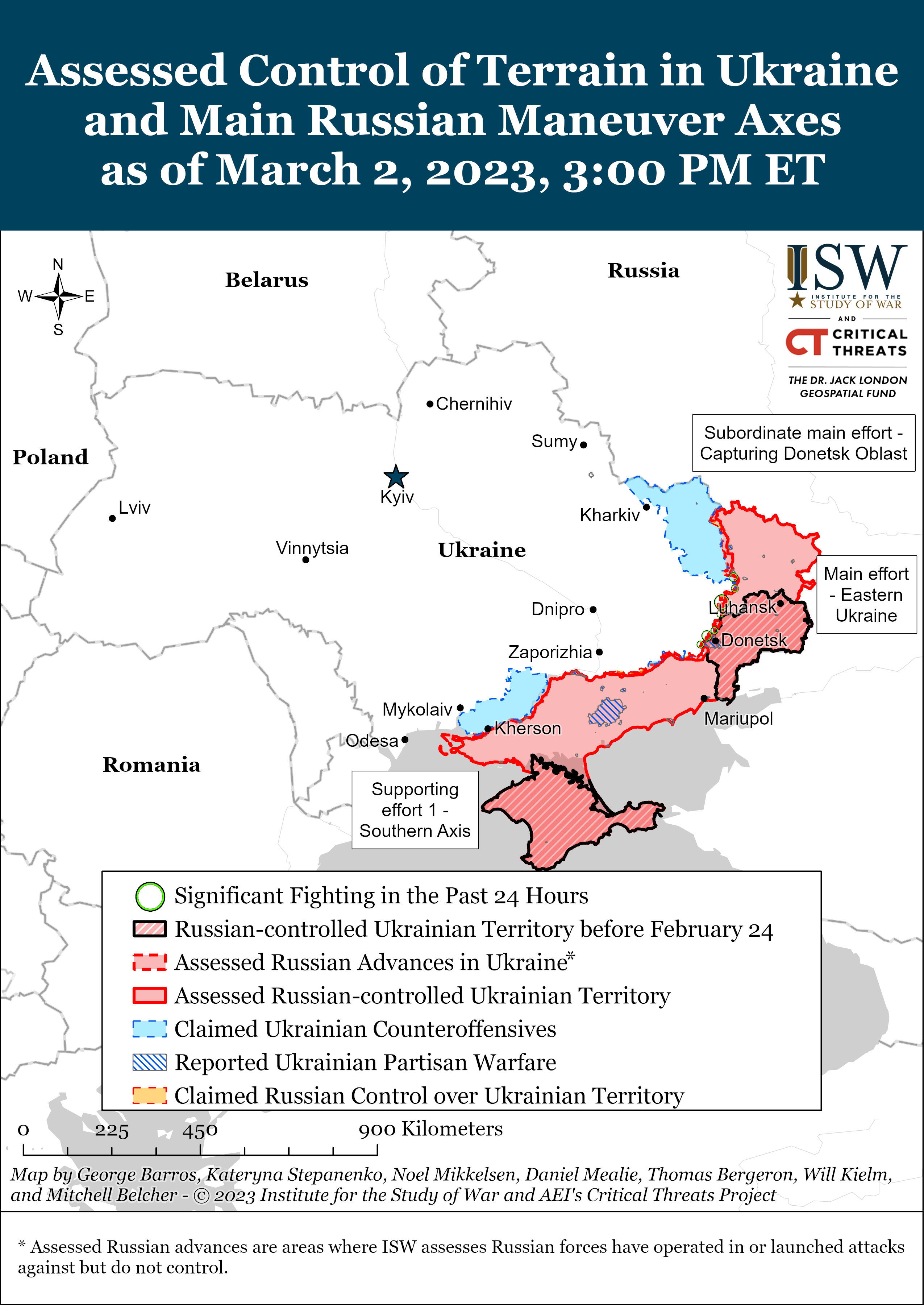
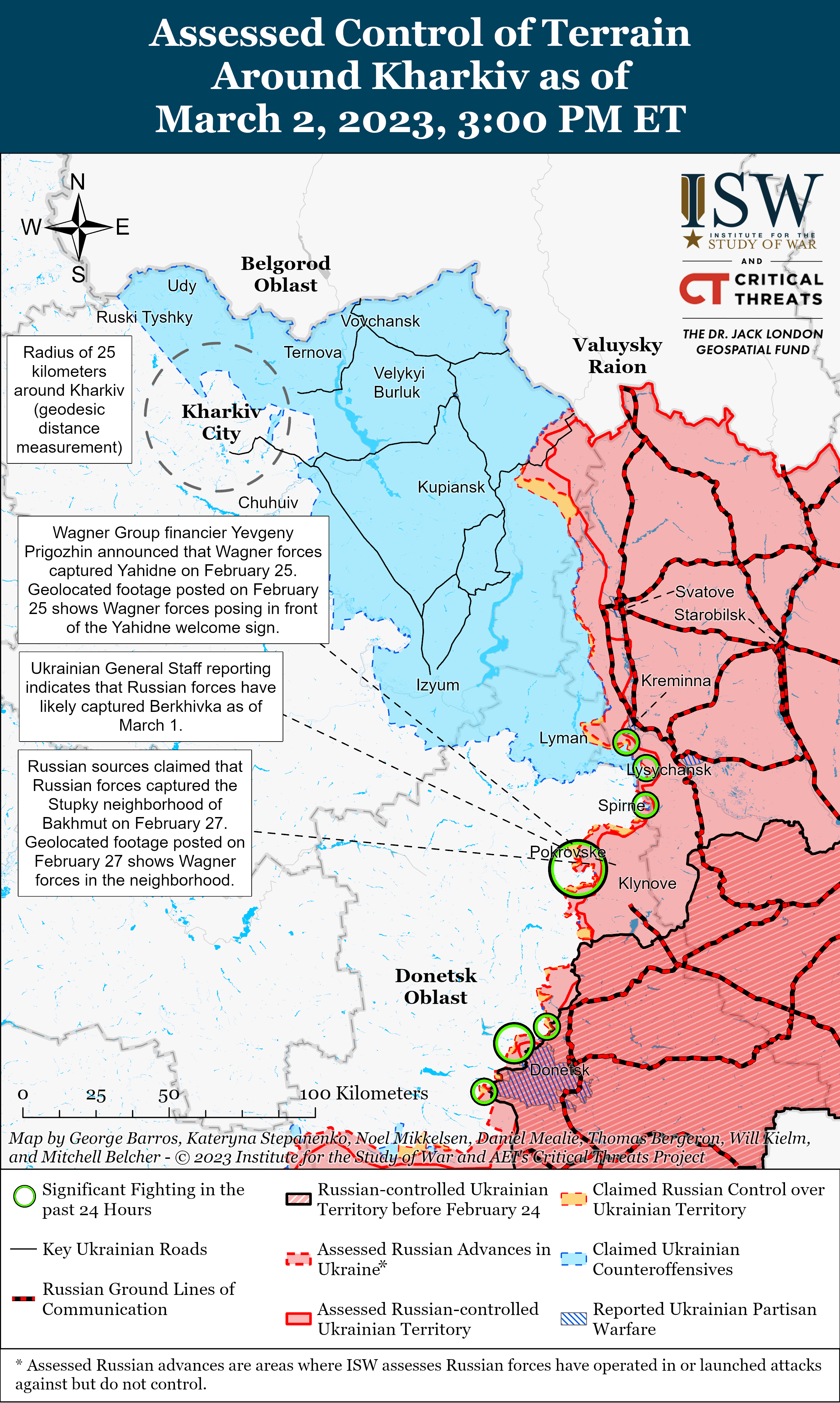
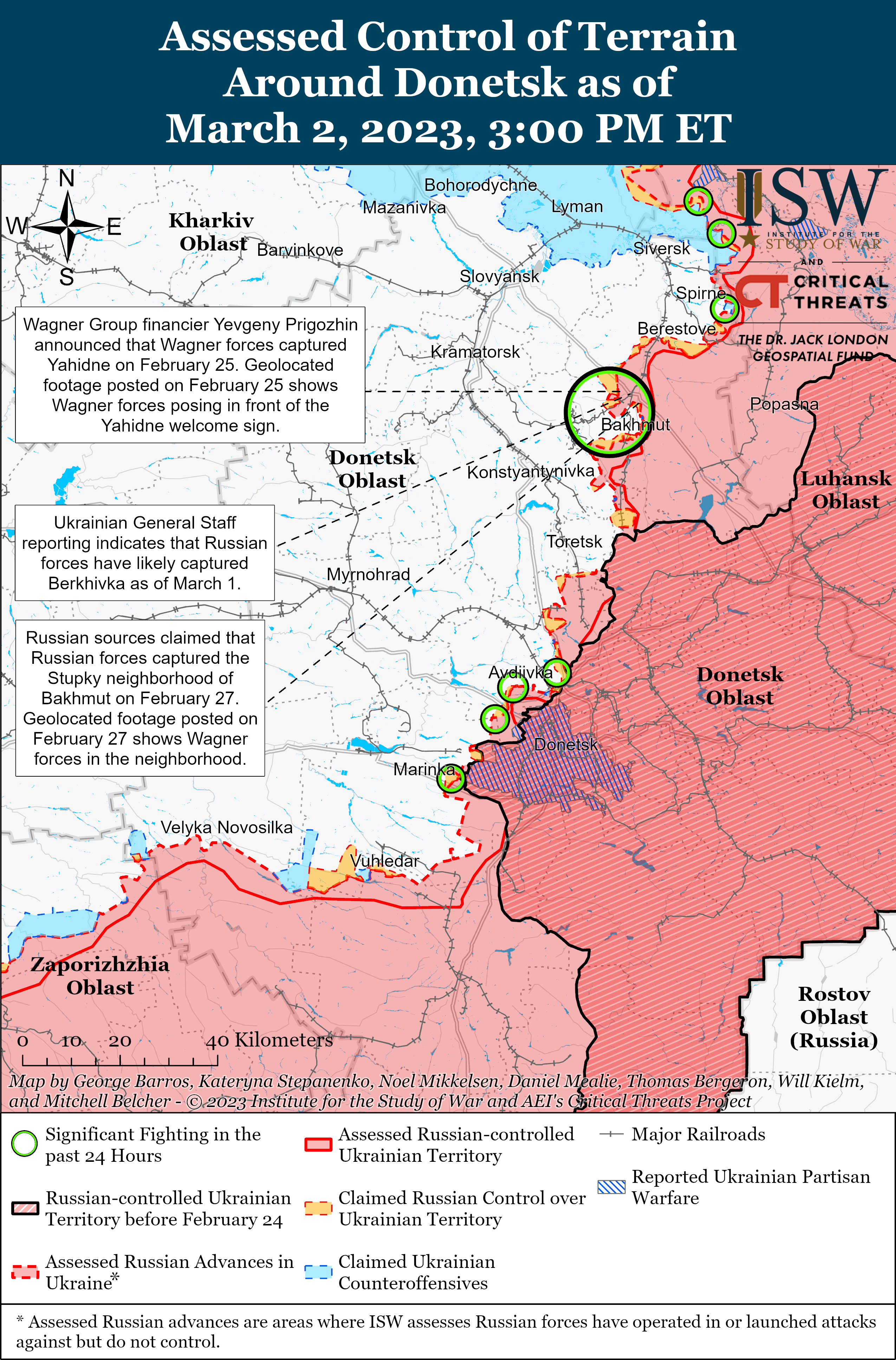
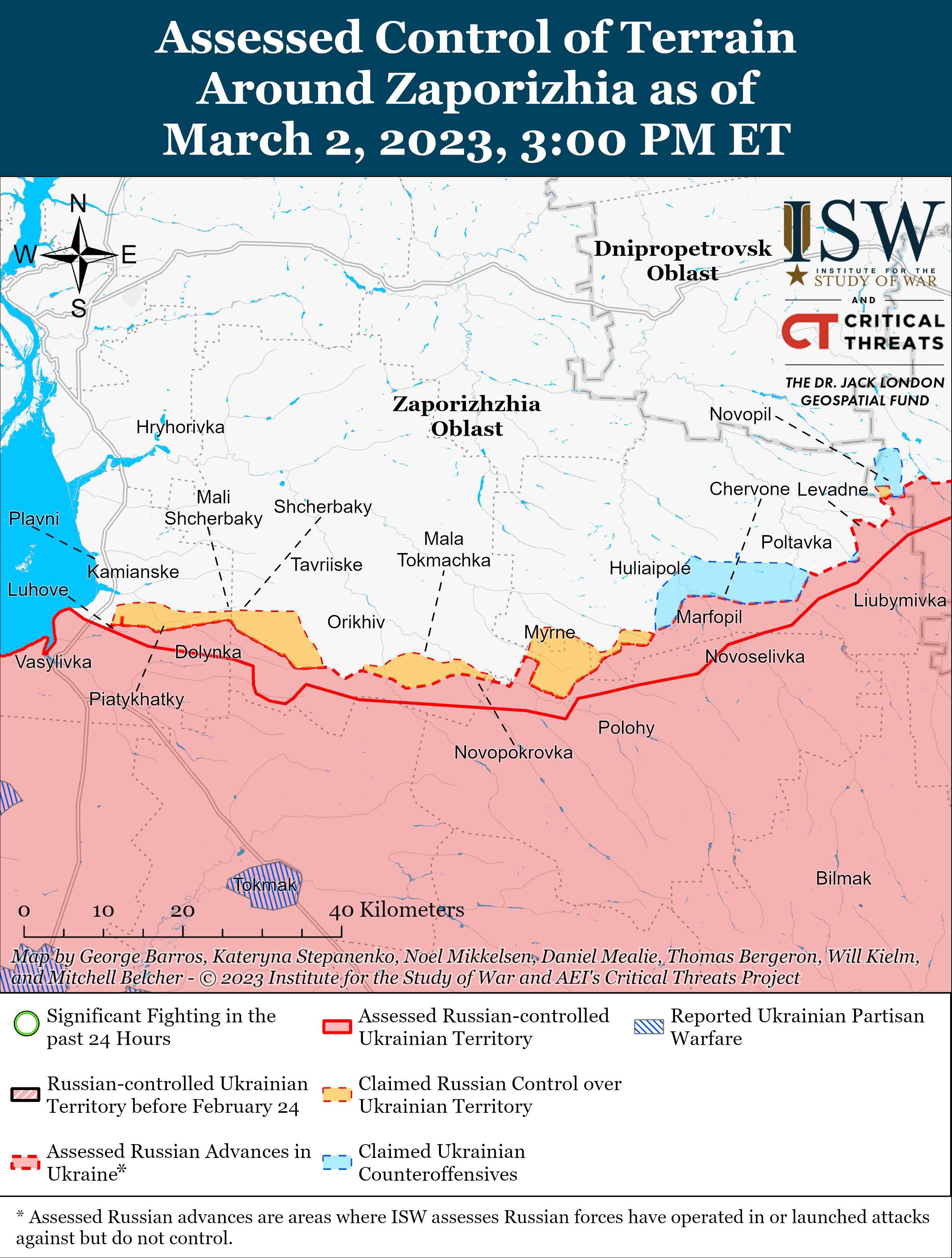
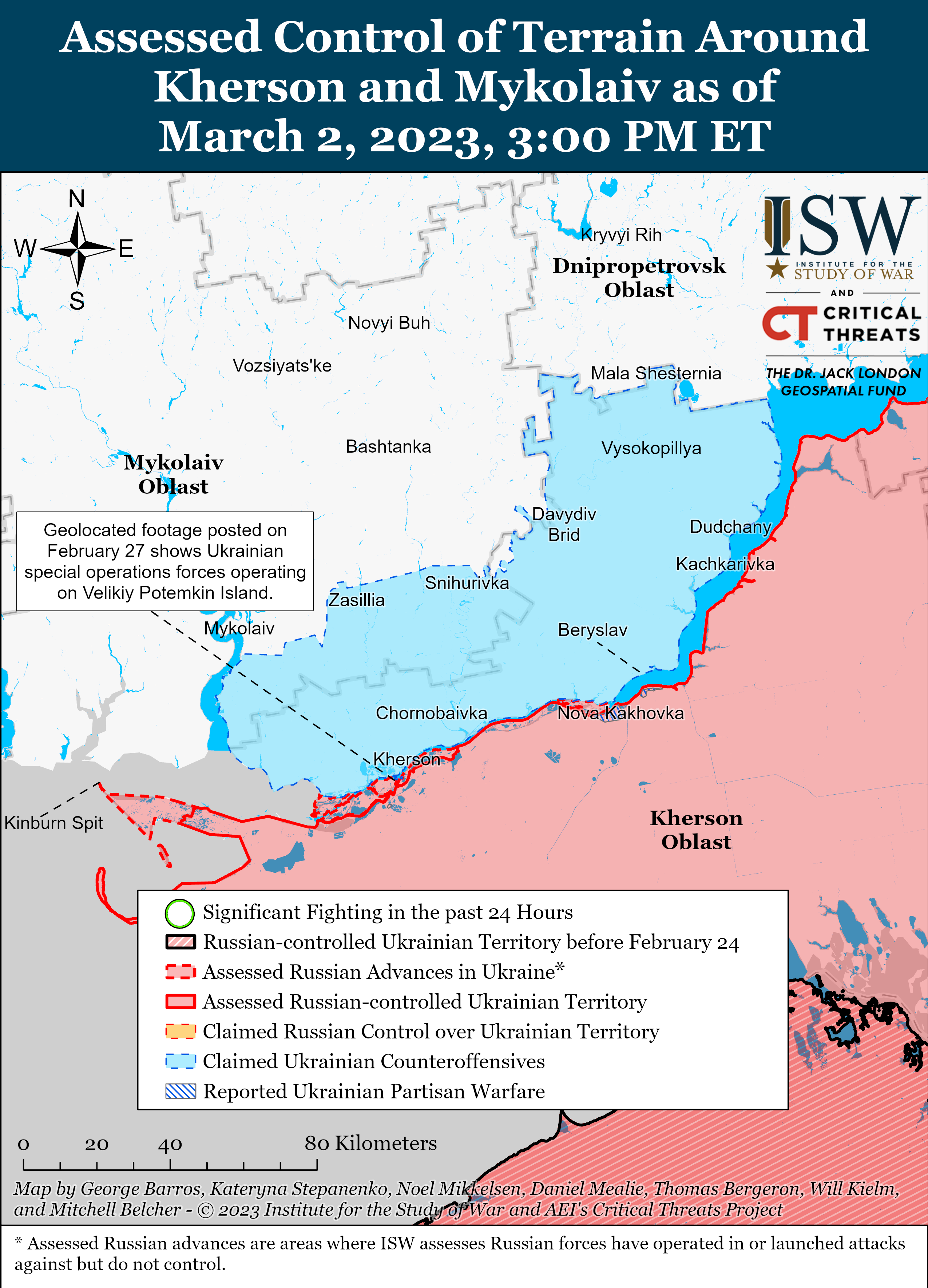
No comments:
Post a Comment